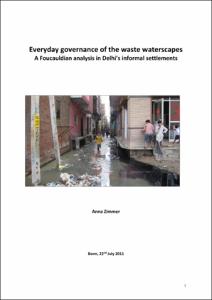Zimmer, Anna: Everyday governance of the waste waterscapes : A Foucauldian analysis in Delhi’s informal settlements. - Bonn, 2012. - Dissertation, Rheinische Friedrich-Wilhelms-Universität Bonn.
Online-Ausgabe in bonndoc: https://nbn-resolving.org/urn:nbn:de:hbz:5-68037
Online-Ausgabe in bonndoc: https://nbn-resolving.org/urn:nbn:de:hbz:5-68037
@phdthesis{handle:20.500.11811/5369.2,
urn: https://nbn-resolving.org/urn:nbn:de:hbz:5-68037,
author = {{Anna Zimmer}},
title = {Everyday governance of the waste waterscapes : A Foucauldian analysis in Delhi’s informal settlements},
school = {Rheinische Friedrich-Wilhelms-Universität Bonn},
year = 2012,
month = sep,
note = {Waste water governance presents a major challenge in India’s cities and megacities. High rainfall variability, partial sewer networks, and waste water discharge through often dilapidated and silted storm water drains lead to impracticalities of daily life, health hazards, and environmental pollution, among other problems. Mostly located in the blanks of the sewer map, exposure to waste water is especially high in informal settlements. As everyday lives get affected, governing the waste waterscape becomes a perpetual negotiation process between local bureaucrats, politicians and residents.
Against this background, this thesis investigates how governance processes produce the waste waterscape, understood as a social, constructed and material space. Combining the literature on governance with insights into the ‘everyday state’ (Fuller & Bénéï, 2001), the concept of everyday governance is developed. To better grasp the effect of power in governance, Foucault’s governmentality approach is introduced. With its help, practices of waste water governance are placed at the centre of analysis. After studying the waste water governmentalities and the approach to informal settlements in Delhi through a genealogical analysis, governance practices are investigated. The analysis is carried out in two types of informal settlements: a squatter settlement and a semi-legal area built in contradiction to the Delhi Master Plan (Unauthorised Colony). In both, qualitative methods such as interviews, ethnographic observation and Participative Urban Appraisal have been used extensively while mapping the settlements with their waste water infrastructure and related problems, too.
Results show that waste water governance is addressed in policies through concerns such as public health, sanitation, and more recently, water and rivers. Waste water is governed through power-laden processes that are predicated on ‘Othering’ (Spivak, 1985) certain groups, labelled as less clean, less ritually pure, or less hygienic.
In Delhi, residents of informal settlements are part of these groups, as their waste water-related practices are characterised as highly problematic and in need of change. Yet, while squatters are not invited to participate in governance processes, inhabitants of the Unauthorised Colony are seen as potential partners in governance by the government. Both groups, however, have very limited opportunities to participate in framing problems of urban governance. This results in major waste water issues being ‘invisible’ to politicians and bureaucrats. At the same time, residents’ self-help is dismissed by state representatives as problematic or even illegal. Results point to processes that powerfully delegitimise inhabitants’ production of the material urban space.},
url = {https://hdl.handle.net/20.500.11811/5369.2}
}
urn: https://nbn-resolving.org/urn:nbn:de:hbz:5-68037,
author = {{Anna Zimmer}},
title = {Everyday governance of the waste waterscapes : A Foucauldian analysis in Delhi’s informal settlements},
school = {Rheinische Friedrich-Wilhelms-Universität Bonn},
year = 2012,
month = sep,
note = {Waste water governance presents a major challenge in India’s cities and megacities. High rainfall variability, partial sewer networks, and waste water discharge through often dilapidated and silted storm water drains lead to impracticalities of daily life, health hazards, and environmental pollution, among other problems. Mostly located in the blanks of the sewer map, exposure to waste water is especially high in informal settlements. As everyday lives get affected, governing the waste waterscape becomes a perpetual negotiation process between local bureaucrats, politicians and residents.
Against this background, this thesis investigates how governance processes produce the waste waterscape, understood as a social, constructed and material space. Combining the literature on governance with insights into the ‘everyday state’ (Fuller & Bénéï, 2001), the concept of everyday governance is developed. To better grasp the effect of power in governance, Foucault’s governmentality approach is introduced. With its help, practices of waste water governance are placed at the centre of analysis. After studying the waste water governmentalities and the approach to informal settlements in Delhi through a genealogical analysis, governance practices are investigated. The analysis is carried out in two types of informal settlements: a squatter settlement and a semi-legal area built in contradiction to the Delhi Master Plan (Unauthorised Colony). In both, qualitative methods such as interviews, ethnographic observation and Participative Urban Appraisal have been used extensively while mapping the settlements with their waste water infrastructure and related problems, too.
Results show that waste water governance is addressed in policies through concerns such as public health, sanitation, and more recently, water and rivers. Waste water is governed through power-laden processes that are predicated on ‘Othering’ (Spivak, 1985) certain groups, labelled as less clean, less ritually pure, or less hygienic.
In Delhi, residents of informal settlements are part of these groups, as their waste water-related practices are characterised as highly problematic and in need of change. Yet, while squatters are not invited to participate in governance processes, inhabitants of the Unauthorised Colony are seen as potential partners in governance by the government. Both groups, however, have very limited opportunities to participate in framing problems of urban governance. This results in major waste water issues being ‘invisible’ to politicians and bureaucrats. At the same time, residents’ self-help is dismissed by state representatives as problematic or even illegal. Results point to processes that powerfully delegitimise inhabitants’ production of the material urban space.},
url = {https://hdl.handle.net/20.500.11811/5369.2}
}






